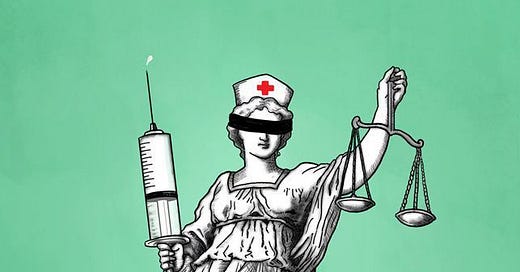The CDC Data Purge: What It Means for Your Health Rights
From STI Protocols to Birth Control: Critical Guidelines Are Vanishing
Lately, it feels impossible to control our news consumption—even if we’re trying. A friend texts you a news headline, “Did you see this?” You open Instagram to memes about something Trump shared on his social media. TikTok opens to “breaking news” from Aaron Parnas.
 Tiktok failed to load.
Tiktok failed to load.Enable 3rd party cookies or use another browser
Many of us feel like we’ve hit our capacity for handling unprecedented life events. From pandemics to political upheavals, we’re living through historical moments at a dizzying pace. But this is our current reality. At the same time, as someone with a voice and platform in this space, it’s hard to find ways to share relevant information without overwhelming or creating more anxiety.
Similar to my work with sexually transmitted infections (STIs) and sharing related news stories, my intention is always to inform you with information I believe can help you defeat the impact of these headlines, rather than instill fear.
The CDC Removed Important Data and Tools: What Happens Now?
Critical information that public health professionals and other related fields rely on has been scrubbed from the Centers for Disease Control and Prevention (CDC), following Trump’s Executive Order.
Over the past month, I’ve been scouring Reddit forums with dedicated government workers and public health professionals for more updated information. Since we can no longer trust the mass media, I’ve found others doing the same.
Countless government workers are scared. Despite confidentiality obligations to their employer, they did what was right by sharing the mandate before it became public knowledge. Thanks to these citizens, many advocates, educators, and healthcare professionals were able to salvage the information they use on a regular basis before it was eliminated.
How does this impact me?
In sharing this news, several people have asked me about the implications of this change. If you don’t rely on CDC data or statistics, it might seem like a meaningless change. But when so many healthcare professionals step up and use their voices and platforms to tell you how terrifying this is—we need to pay attention.
Personally, I lean to the CDC for their information about STIs and sexual health, but there is so much more to it than that. Late last week, several OBGYNs shared they no longer had access to tools they used to help patients select birth control methods or to help patients with STI treatment.
If you’re someone who has been diagnosed with an STI, you probably came across relevant CDC statistics and data at some point. I know I did. Clinical and boring? Yes. Reliable and accurate? Also yes.
The removal of this information has an immediate impact on your care. More critically, the new initiative to deprioritize diversity, equity, and inclusion (DEI) initiatives will also have a long-term impact on your care. Healthcare is a human right. You deserve accurate information about your body—no matter what. The removal of basic public health information is a violation of your healthcare and access to competent care.
What the public doesn’t realize are the long-term longitudinal studies and annual reports housed within the CDC. Off the top of my head, these include the annual STI Surveillance Report and long-term impacts on LGBTQ+ youth. But there are so many others impacted, too.
This data removal has far-reaching consequences beyond just information access. It affects grant funding for vital research and community health programs that rely on CDC statistics to demonstrate need. Additionally, medical education and training for new healthcare providers, who traditionally rely on CDC guidelines for learning best practices, will face significant challenges in understanding how to provide inclusive, evidence-based care.
Trump’s deliberate mischaracterization and weaponization of DEI places these communities and our collective health in further danger. While the full impact remains uncertain, the future looks grim.
What do we do now?
Despite all of the looming clouds and fear surrounding this action, the good news is that there are still good people who genuinely care about your health and care. Thanks to vigilant employees who sounded the alarm, people were able to save crucial information needed to provide safe, quality, and inclusive care.
If you work in a field that relied on CDC information, would like access to this information, or are curious to see where you can find it, you can find resources here:
Abortion, Every Day! by Jessica Valenti: Jessica Valenti is housing CDC guidelines and resources deleted by the Trump Administration. She includes everything from sexual and intimate partner violence, provider resources, to youth reports.
Archive.org: The comprehensive database, collected by data archivists, houses all of the CDC datasets.
Whether everyone knows it or not, we will all be impacted by the increasing amounts of misinformation and attempts to restrict the public from accessing information about their bodies and health.
I want to reiterate that this is not normal. We are not meant to be pounded with an endless barrage of headlines, pummeled with fear for whether the government sees us as human, or worried about our friends and family. None of this is normal, and your feelings and reactions are completely valid.
We’re all overwhelmed.
We’re scared for what’s to come. We’re worried for ourselves and the people and communities we love. We’re running on empty.
As my hope and optimism run low, I am reminded by the many professionals and government workers who jumped into action to salvage CDC data that there are people who care about our well-being, health, and right to exist—even if our government does not.







